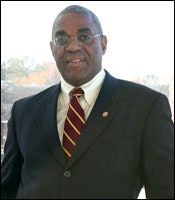Former university presidents John W. Garland, Dr. Dorothy C. Yancy and Dr. Sidney Ribeau who launched TM2 Executive Search several years ago, disbanded it recently to join the consulting team for the executive recruiter Academic Search.
The leaders’ new venture expands the firm’s capacity to attract diverse leadership in executive higher education roles and enriches its ability to identify and cultivate skilled leaders for historically Black colleges and universities (HBCUs).
 John W. Garland
John W. Garland“John, Dorothy and Sidney will all be senior consultants with the firm,” said Dr. L. Jay Lemons, president of Academic Search. “They each bring decades of experience and a deep passion for the Academy. Each brings an extensive network of colleagues not to just enhance HBCU searches, but all of our searches.”
After meetings and conversations between the leaders of Academic Search, TM2 Executive Search and the Thurgood Marshall College Fund (TMCF), the organizations found that there were parallels in each organization’s philosophies.
“The founding insights and values of the two organizations align perfectly,” said TMCF president Dr. Harry Williams.
“We both saw search as strategic opportunities for institutional growth and vitality, not simply transactions,” Lemons added. “We view our role as institutional partners not as vendors, and both organizations had eleemosynary roots to serve the public good.”
John W. Garland, former president of Central State University and former executive chairman of TM² Search, pointed to Academic Search’s status as the oldest higher education search company in the U.S. in regards to how the firm will bolster the TM² Search leaders’ ability to recruit qualified leadership for HBCUs and other majority institutions.
“They have the resources, the talent and the experience,” he said. “To have the opportunity to partner and be a part of that operation means we now have all of those resources and experiences to call on to support our efforts.”
Prior to the new consultants’ on-boarding, Academic Search completed 37 HBCU searches, with 20 being completed in the last 10 years, Lemons said. This year, the firm assisted the University of Maryland Eastern Shore with its presidential search.
 Dr. Dorothy C. Yancy
Dr. Dorothy C. YancyAlthough Garland, Yancy and Ribeau will be consulting for all higher education institutions, their backgrounds as former HBCU presidents give them a perspective to share insight on the unique cultures and challenges that a leader must navigate at HBCUs.
When the search consultants work with schools to generate potential executive candidates, Garland said, “We’re not just referencing that they’ve worked some place, but how successful were they? How do their colleagues and people for whom they work or who they work with understand and acknowledge their service at the institution?”
Garland said that based on his experience, a potential candidate needs to be prepared, curious and appreciative of the “unique, transformative role HBCUs play.”
“I think our institutions, and [higher education] institutions in general, benefit from leadership that knows, going in the door, that they do not have all the answers,” he said, adding that executive leaders should be able to work with other institutional stakeholders, including students, to move the institution forward.
“Very often, I got answers to some very complex problems by interacting and being close to and working directly with students,” Garland said of his time at Central State.
Dr. Leonard L. Haynes III, senior advisor in the Department of Education’s Office of the Under Secretary, added that candidates for leadership roles at HBCUs must have a fundamental grasp of the higher education enterprise, an understanding of technology, a competitive agenda for the institution and humility.
“Successful presidents that I’ve seen, they never talk about themselves, they only talk about the institution,” Haynes said. He highlighted the leadership of Dr. Harold L. Martin, Sr. at North Carolina A&T University and Dr. Billy C. Hawkins at Talladega College as cases in point.
“You’ve got to have somebody who’s willing to be in the game and be consistent,” Haynes added. “Consistent effort over time will produce results. You can’t do it tomorrow morning, you’ve got to have a plan … and the board has to allow you to stay with that plan.”
Haynes has expressed hesitations about the use of external search firms to hire top administrators at HBCUs because they may not always produce the most qualified set of candidates that an institution needs. This can lead to presidential or administrative turnover, he said.
“This isn’t rocket science but, in a way, it is because everyone who talks a good game can’t necessarily do it,” Haynes said. “There’s sort of a back and forth [for HBCUs] – ‘Should we do this? … ‘Do we have enough?’ … ‘We can do it ourselves.’ And the firm is trying to sell the notion, ‘No, you need us.’”
As the field of academic search firms expands and the market grows more competitive, the official sees the hiring of institutional leaders as the responsibility of the Board of Trustees or the Board of Regents.
“They hire the president to administer the school with policies that they approve, and if they cross that line the wrong way, it’s not going to work,” Haynes said, noting a distinction between policymaking and administrating.
Still, higher education institutions are looking to search firms for assistance with their search processes and increasingly requesting firms that demonstrate a commitment to diversity with respect to leadership in searches for candidates, Garland said.
The addition of Garland, Yancy and Ribeau “raises the bar for us and we are proud to have these new colleagues join our team,” said Academic Search Board of Directors chair Dr. Scott Miller.
Tiffany Pennamon can be reached at [email protected]. You can follow her on Twitter @tiffanypennamon.





















